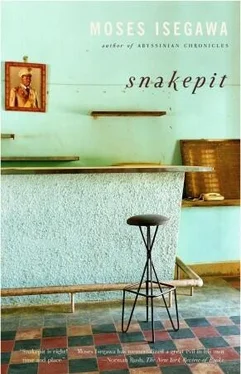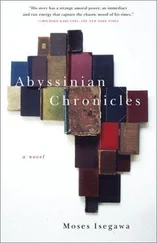“I won’t give him forever, I can assure you, Colonel,” the General said aggressively, the strain of holding back visible in his dilated eyes and exaggerated gestures.
“Reptile is the real trouble-causer as far as I am concerned.”
“I am auctioning him tonight. Do you hear me, Colonel? Any man who brings me his dick gets ten thousand dollars. American. Cash. Day or night. Rain or shine. Do you hear me? Ten thousand. Plus promotion. I want him that badly, I can assure you.”
“You can rely on me, General,” the colonel said stiffly, wondering where the escalation of hostilities would lead. He had told his boss time and again to ignore Reptile most of the time, not to feel unnecessarily provoked, to accept that he was part and parcel of the power structure, without much success.
“Bomb his house. Ambush him. Cut out his tongue, anything. I want to shake the hand of the man who will rid me of this scourge and give me back my peace of mind. Everywhere I look I see that snake, crawling, slithering, smearing everything with slime. Bring me its head and I will make you a cabinet minister, man of the books. This snake wants to investigate me! Who is investigating it? What does it want from me? Tell me, what does that snake want from me?”
“He is bluffing.”
“Well, he won’t bluff when he is dead. I can assure you.”
“True.” The colonel wondered how many times he got to hear the words “I can assure you” in a day. If only each assurance delivered!
“Now tell me, who do you think poses the biggest threat after Ashes?”
“The Vice President.”
“How high do you rate his chances?”
“If he mobilises from other tribes, the non-Muslims, malcontents, he can stage a coup. He is that popular, that close to the soldiers, that anti-you and anti — Marshal Amin.”
The General pulled hard on his joint. “The Marshal seems to think so too.”
“Is he on the red list already?”
“He is nowhere. He is nothing. One grenade; one car crash is enough, I can assure you,” said the General contemptuously.
“This government is expert at traffic control,” the colonel joked. He liked this kind of talk, reading intelligence reports, knowing who was on the way up and who was speedily descending.
The General burst out laughing and said: “One more small business. A little rescue operation to warm your hands for the big task. Get the boy out before Reptile’s men burn him.”
“You mean the smuggler?”
“A greedy, brainless bastard who thought he could make easy money.”
“No problem. We will get him out.”
“Now let us go and get drunk. I am a happy man. Reptile stands on the auction block. What a prospect!”
A very costly one, thought the colonel, biting his lower lip. He liked action and enjoyed to the full being the General’s brain, planning, advising, organizing, delegating authority to the men on the ground who carried out the General’s will. He knew that Amin and his regime would not last; unlike most henchmen, he had his certificates; he could go anywhere and begin anew.
The General never discussed details with the colonel. He had discovered that the more leeway you gave a man, the harder he worked trying to please you. The system had worked remarkably well. General Bazooka had in fact copied it from the Marshal.
General Bazooka was in the mood for his gun pranks, but at the same time he did not want to quarrel with his wife in front of his men. He would have wanted his eldest son to shoot a few glasses, but the boy’s mother would raise so much hell that it would not be worth the bother. Those things the boy would have to learn later in the company of men. What does she teach the children? What do they learn at school? It is definitely not to shoot a piece of chalk out of a teacher’s hand or a pen from behind his ear or a cigarette from his mouth. It struck him that his children might have a different future, a more sedate life. His wife and mother seemed to prefer that to the rigours of army life. But he did not want a teacher for a son, a nurse for a daughter. Except if they were army teachers and nurses. I will look into that, he thought.
He looked forward to a long hot night. A groany, sweaty, satisfactory affair. He liked tilling familiar ground after weeks away. The waiting created a change, a razor edge. It made the familiar sex sounds rendered in his mother tongue, laced with his earliest memories of the act, all the more fulfilling. They would bounce, roll, turn and milk each other like donkeys. Then he would lie in her arms, a delicacy uneroded by the years, watch the light going out of her eyes like receding stars, and feel reconnected to the past in sleep.
At daybreak he would rise, the past night an oasis in an encroaching desert, a lingering of fatigue in his veins, a bunch of memories in his pulsating head, a trace of sweet pain on his sex skin. He would rise out of it tentatively, a plant shooting out of a swamp, and climb into the new day, rejuvenated, invigorated. Ready for business as usual.
COLONEL ROBERT ASHES OFTEN THOUGHT of himself as an airborne bird, an eagle cruising, surveying its domains. His meteoric rise felt like a huge thermal thrust keeping him in the air with minimum effort. He had settled into the fast life. He enjoyed the banquets, the fleet of Boomerangs, the cameras, the sabre-rattling, the marriage, the wealth amidst poverty, the envy he generated and wore like an eagle’s monstrous wings. Only in Africa, he continually said to himself, can a man be reborn this fully, this gloriously.
When he set out for Uganda on the trail of the elusive Irish bomber Williams, he knew that everything was on the line. It was the watershed in his frantic effort to enter Uganda, and at the same time it was like a death sentence. The cover of the delegation could get blown; somebody could cave in under pressure; they could be shot by trigger-happy soldiers; Amin could fail to take the bait. He remembered arriving in Kenya and thinking fleetingly that he had made a mistake and should have remained in Britain or gone back to South Africa. He remembered the sleepless nights in a Kenyan hotel while they waited for a plane. In those days he subsisted on whisky, cigars and biscuits, the food too unpalatable to swallow. He remembered stepping on the plane with the words of his handler ringing in his ears: “You are on your own. If caught, we will deny any knowledge of you. Your head will probably end up in Amin’s fridge, your balls on his breakfast fork.”
He remembered the flight, the glorious scenes outside the window, the rolling mountains, the snaking rivers, the blinding greens of forests. He kept thinking about paradise. He also remembered Williams’ Bombing of the Century, as the Irish Republic Army called the mainland campaign. He remembered hearing the news of the arrest of the bombers, and stories about men thrown from speeding cars, men with teeth pulled during interrogations. Then rumours that Williams was in Uganda and the massive thudding of his heart. It was like being struck by electricity, the muscles burning and tearing with excitement. He remembered the hours of waiting before getting to hear whether he would be sent to Uganda or not. He never believed for once that a man as important as Williams could risk hiding in Uganda; but what did he care? It was the break he needed. In those days there was fear that the IRA would export the campaign and start bombing British embassies abroad, but he did not believe it. The IRA knew what they wanted and how to get it. What did he care?
When he stepped on Ugandan soil, he had the feeling that he had done it before in some hazy past. He was not at all intimidated by the soldiers. He found the statues of Amin ridiculous and ugly. One of the things he remembered most clearly was the vicious urge to supplant Copper Motors officials as the top business force and its head as the top white man in the country.
Читать дальше











